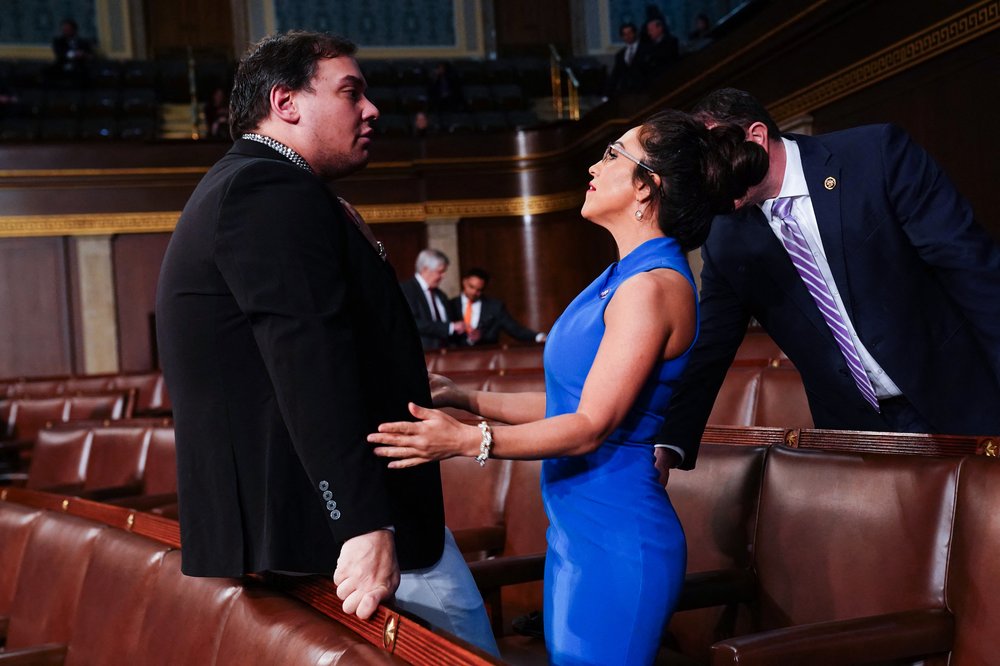George Santos was expelled from the U.S. House. Here’s why he can still run for Congress.
March 8, 2024, 3:55 p.m.
The bar to run is low. Very low.

George Santos’ announcement that he’s running for office again is serving as a reminder to New Yorkers of how low the bar is to run for Congress.
Just more than three months ago, Santos was expelled from the House of Representatives. The Republican who represented parts of Long Island and Queens was found to have lied to voters and donors about his personal and financial history. He faces a 23-count indictment of federal charges that include identity theft, credit card fraud and conspiracy, though he has pleaded not guilty on all counts.
Now, the former U.S. representative said on Thursday he plans to run against fellow Republican Nick LaLota in a neighboring district on Long Island. He did so in his typical attention-getting fashion: while sitting in the back of the House floor during President Joe Biden’s State of the Union address, using a lifetime privilege conferred to former members.
So why is a person with such a dubious history and uncertain future able to seek office? Here’s a quick primer on U.S. election law.
The U.S. Constitution has very few eligibility restrictions for federal office.
When it comes to running for the House of Representatives, the Constitution only requires that candidates be at least 25 years old, a U.S. citizen for at least seven years and a resident of the state they are seeking to represent at the time of election.
Santos, 35, checks all those boxes, so far as we know. His exact residence has not always been clear, but a New York Times story in December 2022 found that he was living in Huntington, N.Y.
It was a Supreme Court case involving New York Rep. Adam Clayton Powell Jr. in 1969 that helped solidify the simple qualifications. Congressmembers had voted not to seat Powell following his re-election in 1966, over some ethics violations and Powell sued. The vote was not the same as an expulsion, such as what Santos faced, but Powell argued it amounted to the same thing.
The court at the time ruled that, “In judging the qualifications of its members, Congress is limited to the standing qualifications prescribed in the Constitution.”
What if he’s convicted of a crime?
It won’t matter if Santos is convicted. And there is historical precedent for convicted felons serving in the House, even if only for a short period.
In 2014, Rep. Michael Grimm of Staten Island won re-election while facing federal tax fraud charges. Grimm eventually pleaded guilty to tax evasion. It was not until two weeks later that he agreed to step down. He went on to serve seven months in prison. In 2018, he made a run for his old seat. His Republican primary opponent, Dan Donovan, said the race presented voters with a choice: "Do they want the lawmaker or the lawbreaker?” Donovan won.
In a prominent earlier example, Charles Diggs, a Democrat from Detroit, continued to serve in the House in 1979 even after he was convicted of mail fraud and kickback charges. He resigned a year later before heading to prison.
What if Santos is sentenced to prison?
Santos faces up to 22 years in federal prison, but he can still campaign from behind bars.
In one of the most infamous examples, socialist candidate Eugene V. Debs campaigned for the presidency from a federal prison, where he was serving a 10-year sentence for sedition. Nevertheless, he received nearly a million votes in the 1920 election.
If Santos wins, the Constitution does not specifically prohibit him from serving in Congress from a prison cell although it does say that each body of Congress can “compel the attendance of absent members.”
But while almost anyone can run for Congress in theory, there are two significant hurdles. Santos needs to get about 1,250 valid signatures of registered voters just to get on the ballot. And then he has to convince Republican voters to choose him over an incumbent congressman, all while facing a criminal trial.
LaLota, one of the Republicans who led the charge to oust Santos, said he’s welcoming the fight.
“To raise the standard in Congress, and to hold a pathological liar who stole an election accountable, I led the charge to expel George Santos," LaLota said in a statement. "If finishing the job requires beating him in a primary, count me in.”
Expelled from Congress, George Santos will run again in neighboring NY district Congress expels Rep. George Santos on 3rd attempt: What happens next?